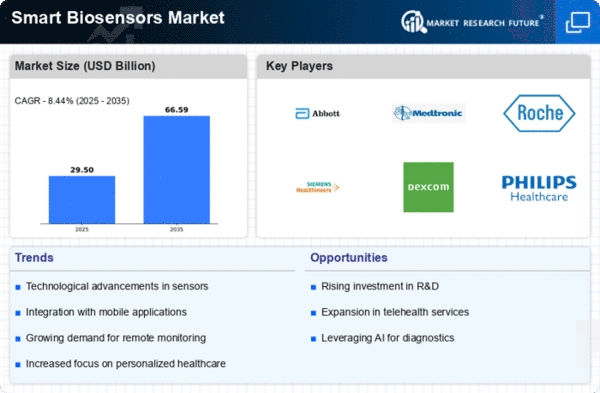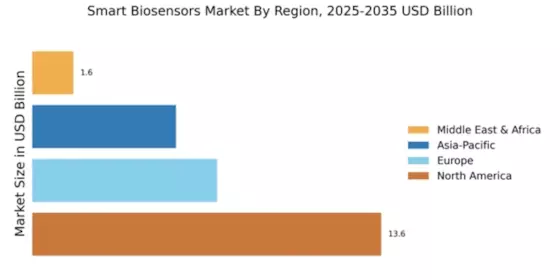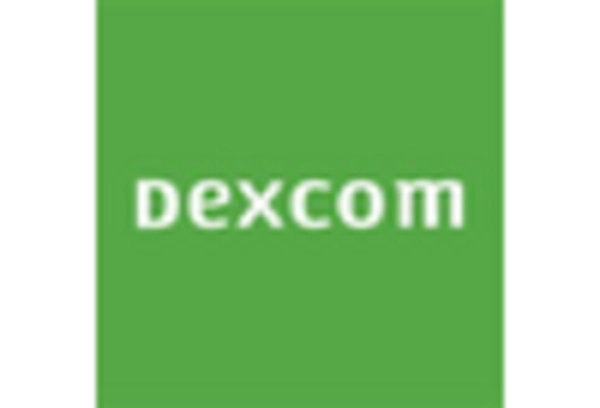Market Growth Projections
The Global Smart Biosensors Market Industry is poised for substantial growth, with projections indicating a market value of 10.3 USD Billion in 2024 and an anticipated increase to 33.2 USD Billion by 2035. This growth trajectory suggests a compound annual growth rate of 11.25% from 2025 to 2035, reflecting the increasing adoption of biosensor technologies across various applications. Factors such as rising healthcare expenditures, advancements in biosensor technology, and growing consumer awareness about health monitoring are likely to drive this expansion. The market's evolution indicates a promising future for smart biosensors, positioning them as integral components of modern healthcare.
Growing Focus on Personalized Medicine
The Global Smart Biosensors Market Industry is significantly influenced by the growing focus on personalized medicine, which tailors medical treatment to individual characteristics. Smart biosensors enable healthcare providers to gather real-time data on patients, allowing for more precise and effective treatment plans. This shift towards personalized healthcare is driven by advancements in genomics and biotechnology, which emphasize the need for individualized approaches. As the demand for personalized medicine continues to rise, the market for smart biosensors is expected to expand, with a projected compound annual growth rate of 11.25% from 2025 to 2035, highlighting the potential for innovation in this sector.
Rising Demand for Wearable Health Devices
The Global Smart Biosensors Market Industry experiences a surge in demand for wearable health devices, which integrate biosensors for real-time health monitoring. These devices, such as smartwatches and fitness trackers, provide users with continuous data on vital signs, glucose levels, and other health metrics. The increasing prevalence of chronic diseases and the growing emphasis on preventive healthcare drive this demand. As a result, the market is projected to reach 10.3 USD Billion in 2024, reflecting a significant shift towards personalized health management. This trend indicates a broader acceptance of technology in healthcare, enhancing patient engagement and self-management.
Regulatory Support for Biosensor Development
Regulatory bodies are increasingly supporting the development and commercialization of smart biosensors within the Global Smart Biosensors Market Industry. Streamlined approval processes and guidelines for biosensor technologies encourage innovation and facilitate market entry for new products. For instance, regulatory frameworks that promote the use of biosensors in clinical settings enhance their credibility and acceptance among healthcare professionals. This supportive environment not only accelerates the introduction of novel biosensors but also fosters collaboration between industry stakeholders, including researchers, manufacturers, and healthcare providers, ultimately contributing to market growth.
Technological Advancements in Biosensor Design
Technological innovations play a crucial role in the Global Smart Biosensors Market Industry, leading to the development of more efficient and accurate biosensors. Advances in nanotechnology, microfabrication, and materials science have enabled the creation of biosensors that are smaller, more sensitive, and capable of detecting a wider range of biomarkers. For instance, the integration of lab-on-a-chip technology allows for rapid diagnostics in point-of-care settings. These advancements not only improve the performance of biosensors but also expand their applications across various fields, including diagnostics, environmental monitoring, and food safety, thereby driving market growth.
Increasing Investment in Healthcare Infrastructure
The Global Smart Biosensors Market Industry benefits from increasing investments in healthcare infrastructure, particularly in developing regions. Governments and private entities are recognizing the importance of advanced healthcare technologies to improve patient outcomes and streamline healthcare delivery. For example, initiatives aimed at enhancing telemedicine and remote patient monitoring are gaining traction, which necessitates the integration of smart biosensors. This investment trend is expected to contribute to the market's growth, with projections indicating a rise to 33.2 USD Billion by 2035. Enhanced healthcare infrastructure facilitates the adoption of biosensors, making them more accessible to a broader population.

















